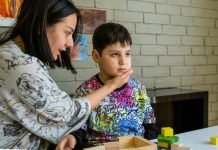
In a recent study, scientists from the University of Maryland School of Medicine have uncovered a fascinating connection that might explain why some children develop certain brain-related disorders.
They’ve found that inflammation in childhood—a common response by the body to fight off things like infections or deal with asthma—can significantly impact the development of brain cells.
This discovery sheds light on the potential origins of neurodevelopmental disorders, which include conditions like autism and schizophrenia. These conditions often make communication, social interaction, and emotional management challenging for those affected.
Neurodevelopmental disorders are a group of conditions that disrupt the brain’s growth and function. They usually show up early in life and can affect a person throughout their lifetime.
Autism spectrum disorder and attention-deficit/hyperactivity disorder (ADHD) are among the most recognized examples. Individuals with these disorders may find learning, communicating, and interacting with others particularly difficult.
The human brain is incredibly complex, starting to form in the womb and continuing to develop into adolescence. It’s made up of billions of neurons—tiny cells that help us think, move, and feel by sending messages to each other.
An important part of the brain called the cerebellum plays a crucial role in this system. It’s not only key to movement, allowing us to perform actions like walking and writing, but it also influences our thinking, social skills, and emotions.
The researchers focused on how childhood inflammation impacts the cerebellum’s development. Inflammation is how the body reacts to harm, but it can sometimes lead to health problems.
The team studied the brains of children who had passed away from inflammatory conditions and compared them to those of children who died from accidents. They employed advanced techniques to look closely at the brain cells.
Their findings were striking. In children who had experienced early inflammation, certain neurons in the cerebellum, specifically Golgi and Purkinje neurons, didn’t develop correctly.
Golgi neurons help cells within the cerebellum communicate, while Purkinje neurons are vital for connecting the cerebellum with other brain areas that control thinking and emotions.
The improper development of these neurons in children who had faced inflammation might be a critical piece in understanding the puzzle of neurodevelopmental disorders.
This breakthrough is more than just an academic achievement; it holds the promise of leading to new ways to treat or even prevent disorders like autism and schizophrenia.
By pinpointing how inflammation affects the brain, scientists and doctors can explore innovative strategies to mitigate these conditions’ impacts on children’s lives.
Neurodevelopmental disorders pose significant challenges not just for the individuals diagnosed with them, but also for their families. Discoveries like this one are vital steps forward in the ongoing quest to improve their quality of life.
The complexity of the human brain means there’s still much to learn about its development and functioning. Research efforts worldwide aim to unravel these mysteries, offering hope that we can better support those with neurodevelopmental disorders.
With each new study, we inch closer to understanding the intricate ways in which our brains work and how we can intervene to help those affected by these challenging conditions. This latest finding is a reminder of the power of scientific inquiry to change lives for the better.
If you care about ADHD, please read studies about 5 signs you have ADHD, not laziness, and new drug to reduce daydreaming, fatigue, and brain sluggishness in ADHD.
For more information about ADHD, please see recent studies about Nutrition’s role in managing ADHD: what you need to know and results showing that Food additives and ADHD: what parents should know.
Copyright © 2024 Knowridge Science Report. All rights reserved.



